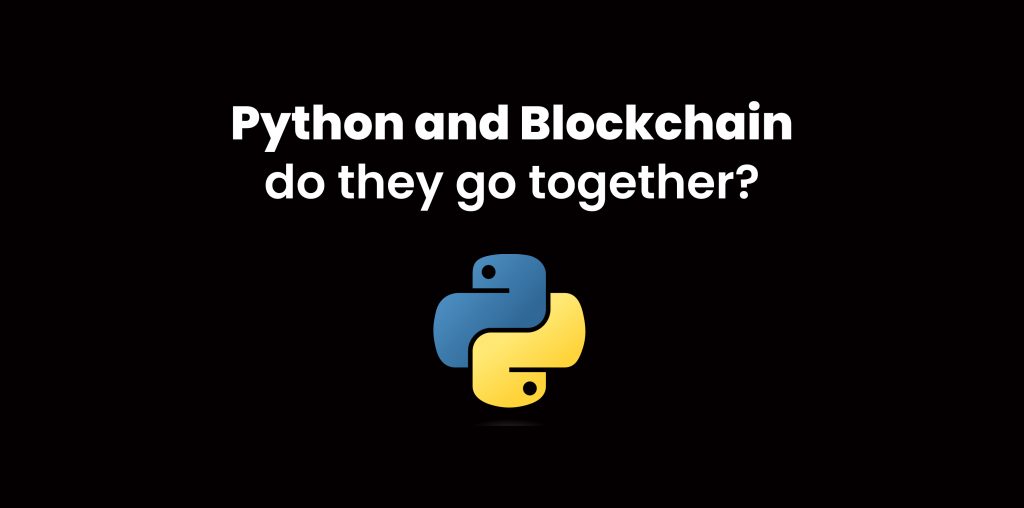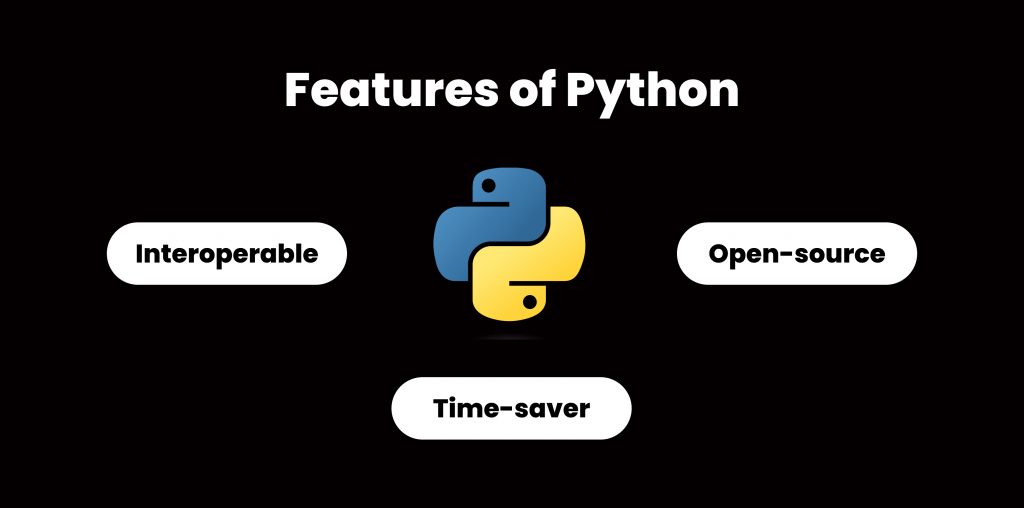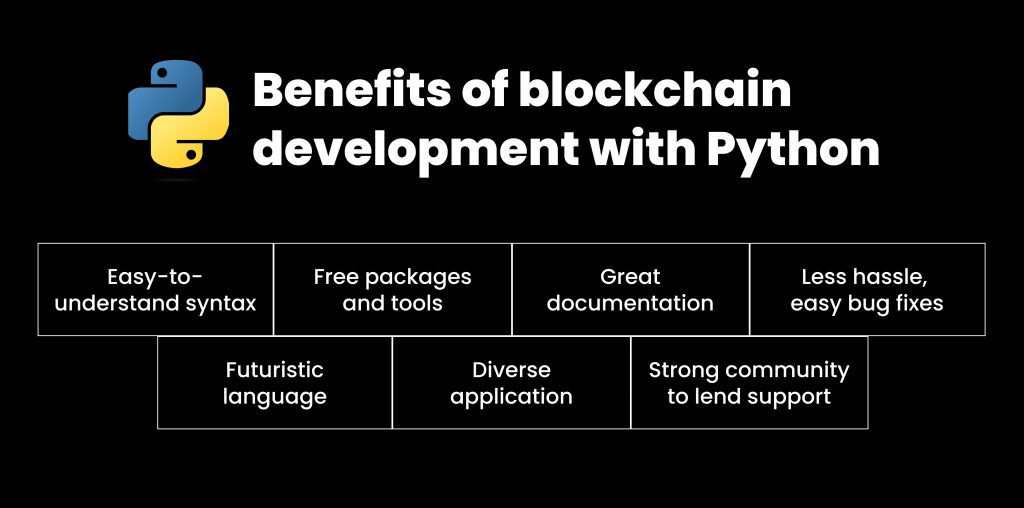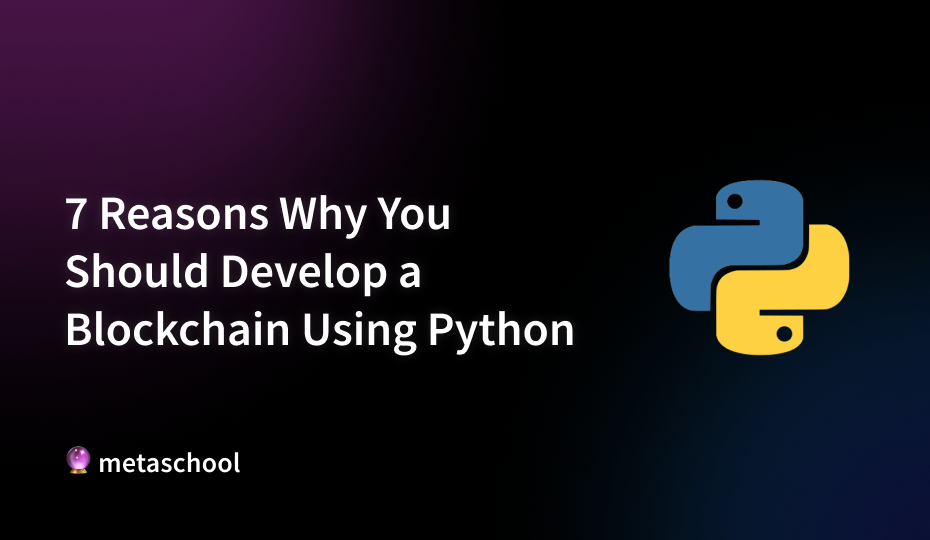Table of Contents
Blockchain programming is not easy. It requires a lot of technical expertise and knowledge to code a simple blockchain. While there is no easy way out, there is definitely a simpler and faster way to do the needful. And you guessed it right, it is with none other than Python. Yep, you can code a blockchain with Python.
But first, let’s understand some basics.
Intro to building a blockchain with Python
Python is a programming language with a plethora of modules and ready-to-use tools. It also has a humongous library full of coding knowledge, methods, and instructions.
As of 2022, some 48.07% of the developers around the world use Python.
Owing to its versatile nature, Python can be used to create a simple calculator using Scripts & Programs, and something as complex as a full-stack application.
In fact, some of the most popular social media giants in the web2 space were either entirely or partially created using Python. They include Instagram, Facebook, Spotify, Pinterest, and Twitter. Pretty sure you’re using at least one of these even today.

When blockchain technology in the web3 space picked up pace, Python evolved into a suitable blockchain development language as well. It further enhanced its core features, shortcodes and minimalism, to leverage blockchain tech and look attractive to blockchain developers and users alike.
As of today, various blockchains such as Hyperledger, NEO and Ethereum use Python for the creation of smart contracts and decentralized applications (dApps).
And so in this blog, I’ll be making a case for why you should be programming your blockchain with Python.
Features of Python
Python is an easy-to-use, object-oriented programming language due to which it is one of the most used programming languages. Before we jump to the reasons, let us quickly review some important Python features.

1. Open source
Its top feature is that it is completely open source. This makes Python literally free gold compared to other popular languages such as C++, Java, and Vyper, which are not entirely open-source.
2. Time-saving
Python can save a lot of time for a user. An example of this is that Python is both a strongly and dynamically typed language. The latter feature of the language automatically assigns values to all the variables in a dataset. Languages such as C++ and Java expect a user to manually assign values to variables. This can be time-consuming and taxing if the dataset is extensive. Thus, Python greatly helps a user when it comes to data processing and cleaning.
3. Interoperable
Lastly, Python has quite some interoperability. C++ can host it. Python modules can also be imported to Swift – yet another popular programming language. Similar interaction and communication can be enabled between Python and JavaScript as well.
Benefits of developing a blockchain with Python
Developing a Python-based blockchain offers a multitude of benefits. This includes its renowned simplicity and readability, enabling developers to write clean and efficient code that is easy to understand and maintain. Let’s take a look at several reasons why you should be taking up it for blockchain development.

1. Easy-to-understand syntax
Python is a no fluff programming language. It has a clean and easy syntax. In order to benefit from its complete functionality, there is generally no extra feature, software, or hardware that you need to install. This is because it has a “batteries included” approach which loosely means that it has all parts included for full usability.
An in-depth analysis of Python’s syntax has some amazing takeaways which further back the argument that it probably has the simplest syntax out there. The takeaways are:
- Many of Python’s symbols and phrases are borrowed from the English language accompanied by basic mathematical terms. In fact, there are packages that you can use to detect non-English keywords and phrases in Python to further streamline and simplify your experience of using the language.
- The Python syntax provides you with a wide range of tools and features that are sufficient to create basic programs, removing the need of delving into the intricacies of the language. You don’t have to know what dynamic dispatch or polymorphism – two programming terms – means to understand what
whileloop does. - Python syntax does not modify itself nor do the commands randomly change. A
whilestatement shall always remain awhilestatement. Python syntax works on patterns which means you can quickly learn the language. - Lastly, Python conspicuously puts into use the different punctuation marks to give more structure to your code and programming in general.
2. Free packages and tools for blockchain development
There is no doubt that Python is widely used in high-performance computing. Over time it has integrated tools and libraries into itself that are especially helpful and important for blockchain developers.
Python packages are specifically valuable for blockchain development because they leverage dynamic cryptography and encryption, which are beneficial for the blockchain. Additionally, the dynamic nature of Python as a programming language greatly supports blockchain developers.
Examples on how to benefit from them
- To access open-source toolkits and libraries on Python, you may refer to Python’s Pip Installer using this command:
WindowsDrive:\Python Installation Directory>python -m pip install <packagename>
2. Blockchain has some constituents and functions such as hash values and consensus mechanisms that are like its building blocks. These functions and constituents are either generated or commanded. Hashing algorithms like SHA-256 for Bitcoin and Ethhash for Ethereum are integral parts of the blockchain system. They are used to generate a hash value that plays a pivotal role in the security and integrity of a blockchain.
Similarly, there is a lot of coding involved in programming a blockchain to follow a specific consensus mechanism especially PoW or proof-of-work, which involves mining, an energy-heavy process. Python’s well-curated and dynamic library of codes, “hashlib” library allows a developer to generate cryptographic functions and program their blockchain for mining operations as well.
3. Finally, it is crucial to highlight the significance of both back-end and front-end development when it comes to applications, including decentralized ones. Python proves to be an invaluable language for web API development, with its framework Flask offering immense potential for web3 developers and programmers. Additionally, Flask is widely employed in smart contract development. To integrate Flask, you can utilize the following extension for installation.
WindowsDrive:\Python Installation Directory>python -m pip install flask
Hopefully now you get that Python is quite extensive and magnanimous in its tools library, minimalism, and overall functions. As easy as Python is to navigate through, the blockchain ecosystem – being a novel phenomenon – is equally challenging and complex.
However, Python’s well-curated blockchain library and packages make it easier for new and experienced developers and users alike to get a better understanding of the emerging juggernaut that is blockchain.
3. Offers great documentation
It is said and believed that a code is more often read than written. To read a code, it is important to document it and save it somewhere. Python takes special care of this for it offers great documentation. This is yet another solid reason why you should be using Python.
✨ Know Cadence? Learn to build smart contracts on the Flow Blockchain
Being an open-source programming language, Python has everything you need on its website. You can take your time to access it and consequently learn it.
To give an example, Python’s website has a specific chapter of modules namely Cryptographic Services. It has a number of cryptographic functions in the standard library that a web3 developer can put into use. It also ensures that developers have clear and precise instructions on how to use these services.
4. Less hassle, easy bug fixes
Python makes it super easy for developers to operate the language because, unlike other popular languages like C++, it does not require to be compiled again and again. Compilation in programming languages is essentially converting human-understandable code to machine-understandable code.
Let’s imagine a scenario here. You have been building a decentralized application and when you run it, there is a big error. In a language other than Python, you would have to immediately stop the application. Then you have to go back and assess your code, find out the bug, fix it, and recompile the code to try again to run your application.
Python saves you from all this hassle because all you would have to do is fix the bug and re-run the application in Python. There is absolutely no need to recompile the code only to fix a minor coding error. This particular characteristic is advantageous in blockchain coding where quick bug fixes are necessary and can come in handy.
5. Futuristic language
As mentioned earlier, Python has remained a go-to programming language for over 30 years. But it hasn’t slowed down. Many would easily also call it the language of the future.
As of 2021, Python is said to have some 8 million highly professional users and 25 million amateur programmers. With that, Python also has quite an immersive, strong, and trustworthy community that makes it developers’ default and preferred programming language.
As a language, it is suitable for both millennials and Gen-Z. Everyone, from beginners to those embarking on individual creation and research can use the language with ease without paying hefty amounts to buy licenses, toolkits and packages.
Coding is not inherently inaccessible but new and up-to-date software can be expensive. Cracked versions do not ensure safety. In a time like this, Python has been consistently developing itself, adding more features, more packages and simultaneously documenting it all for a common developer.
Its step into the web3 space is a huge one and something that has made blockchain development not only accessible but also easy.
6. Diverse application
Python developers brag about it storing over 150,000 different packages for coding. In a time where people are rapidly adapting to machine learning, artificial intelligence and shifting to automation, Python is definitely a language that they can get the most use out of.
Python’s app development is so strong which can be beneficial for decentralized applications. A case in point is Spotify’s algorithm that exactly knows what to show you.
You would know that blockchain technology does not compromise on security and integrity. And so, Python’s web programming prioritizes robust security for applications which can be extremely useful for blockchain.
Moreover, when it comes to enterprise-based use cases of blockchains built using Python, the following things are never taken for granted:
- Transaction security
- Identity protection
- Backup data for the enterprise
This is yet another reason why Python should be your first choice for blockchain development.
7. Strong community to lend support
All these reasons mentioned within this blog together simplify a blockchain developer’s work. Be it an advanced developer or a newbie programmer, the different features and functionalities of Python make it a language worth trying and putting effort into.
Moreover, since it is amongst the top 5 most used programming languages, there is a great community that is always ready to help fellow developers. There is always going to be a support forum for a developer and programmer to share their queries and get answers which makes development of blockchain much much easier.
And to end,
Blockchain developers can make the most use of Python. From easy-to-understand and simple syntax to multiple packages available for the development of a simple blockchain, Python’s got it all.
Python’s vision is to keep updating itself and become a language that is still one of the most used programming languages years down the road. Thus, if the vision is so strong, the outcome can also be expected to be equally phenomenal and awe-inspiring.
Its interoperability, integration of AI and ML features, security as a top priority, and close-knitted community make it a force to be reckoned with. These are the reasons why blockchain developers should especially look into and read more about Python to leverage it for their own benefits in the future.
